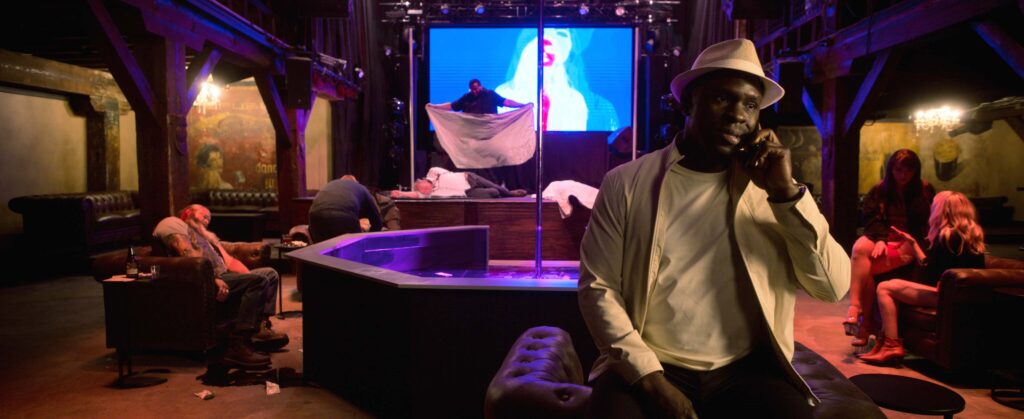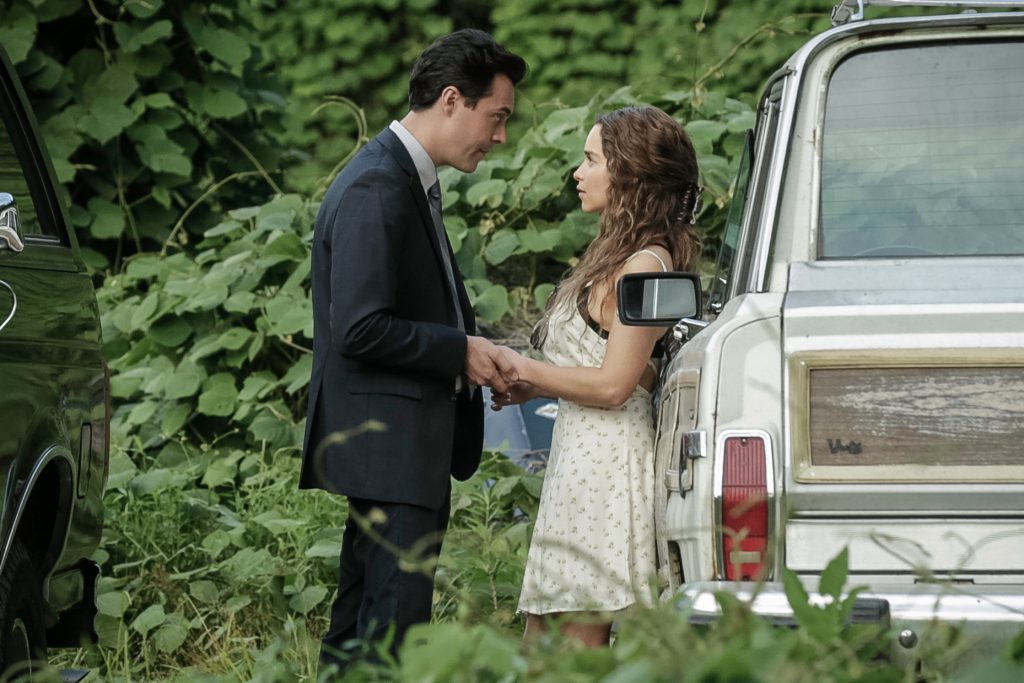December 30, 2023
by Carla Hay

Directed by Phillip Noyce
Culture Representation: Taking place in Biloxi, Mississippi, and in New Orelans, the action film “Fast Charlie” (based on the novel “Gun Monkeys” features a predominantly white cast of characters portraying the working-class, middle-class and criminal underground.
Culture Clash: An assassin goes on a mission to get revenge on the crime boss who masacred many of the assassin’s colleagues.
Culture Audience: “Fast Charlie” will appeal primarily to people who are fans of star Pierce Brosnan and action films about feuding criminals that have an amusing edge.

The dark comedy in “Fast Charlie” can get a little dicey and off-kilter, but this crime caper has a winning performance from Pierce Brosnan as a world-weary assassin. It’s a violent movie that doesn’t take itself too seriously and has some funny surprises. When the outlandish jokes work well in “Fast Charlie,” they’re the best things in the movie.
Directed by Phillip Noyce and written by Richard Wenk, “Fast Charlie” is based on Victor Gischler’s 2001 novel “Gun Monkeys.” The movie is a mostly skillful blend of grisly action and crime noir with a somewhat satirical tone. “Fast Charlie” features some voiceover narration from protagonist Charlie Swift (played by Pierce Brosnan), an assassin who is the type of killer who maintains a gentlemany air about him, even when he’s committing ruthless acts of violence.
The opening scene begins in New Orleans, where Charlie has been cornered by in a junkyard by an enemy who is not yet seen on camera Charlie is ordered by this nemesis to take off his trousers. Charlie then says in a voiceover that reveals his inner thoughts at that moment: “I always thought my life would end like this in some godforsaken place, from a bullet I didn’t see coming. I just thought I’d never care.” Much later the movie, “Fast Charlie” circles back to these scene, with viewers knowing that that point how Charlie ended up there.
Most of “Fast Charlie” takes place in Biloxi, Mississippi, where Charlie lives. (“Fast Charlie” was actually filmed in Louisiana.) He works for a crime lord named Stan Mullen (played by James Caan, in one of his last on-screen performances), who has been Charlie’s friend for the past 33 years. Charlie is a bachelor who lives alone and has no children. Stan treats the people who work for him like his family, including having cookouts at his house.
While he’s in Biloxi, Charlie gets ready to go on a job to kill someone by putting on a casual business suit. Charlie says in a voicever: “One thing you don’t want to see is me in a suit this early in the morning, which means I’m working, which means someone is about to depart this life unexpectedly.” A running joke in the movie is that Charlie talks more like a college professor than an ignorant thug
The target of this murder is a man named Rollo, who is a low-level criminal based in New Orleans. Rollo has apparently stolen some money and done some other things that have put a hit on him. Charlie is joined by a goofy assistant named Blade (played by Brennan Keel Cook), who is fairly new to Stan’s crew.
Blade, who got this nickname because he’s known using knives as murder weapons, has chosen a different tactic to kill Rollo. Blade proudly tells Charlie that he knows Rollo loves donuts, so Blade is going to pretend to be a donut delivery person giving a surprise gift to Rollo at the house where Rollo is.
Blade shows off the T-shirt he made for the occasion. The T-shirt says “Crispy Cream,” not “Krispy Kreme.” Charlie points out the error, but Blade cheerfully doesn’t care. Blade delivers the box of donuts, which contained a bomb planted in one of the donuts.
When Charlie and Blade go inside the house after the explosion, they see that Rollo’s head has been blown off and is completely destroyed. And now, Charlie and Blade have to figure out a way for to prove that the headless body really is Rollo. (Yes, it’s that kind of movie.)
Charlie happens to know the name of Charlie’s ex-wife Marcie (played by Morena Baccarin), so he quickly tracks her down and tells her about Rollo’s death. Marcie, who is a taxidermist who works at home, tells Charlie she isn’t surprised that Rollo was murdered, based on all the shady things she knew he was doing. Marcie is also smart enough to figure out that Charlie is a hit man who was involved in Charlie’s death, especially when he offers her $5,000 if he can identify the body. There’s an immediate and obvious spark between Charlie and Marcie the first time that they meet each other.
Marcie declines the offer and says she’ll do it for free. It just so happens she knows exactly how to identify Rollo. She tells Charlie that shortly after Marcie and Rollo were married, they got matching tattoos on their butt cheeks. This matching tattoo is used for a few sight gags in “Fast Charlie.” If this type of comedy doesn’t interest you, then “Fast Charlie” is not for you.
Stan and Charlie, who have a father/son type of relationship, are very loyal and protective of each other. Stan, who uses a wheelchair, is showing signs of dementia. Other people who work for Stan include Benny Moran (played by Toby Huss), who runs Stan’s “gentlemen’s clubs”; Paulie (played by Jacob Grodnik), Stan’s chauffeur; and Tony D (played by Don Yesso), who runs Stan’s gambling operations.
A massacre happens that kills several of Charlie’s co-workers, who were like family to him. Charlie immediately suspects that a crime boss named Beggar (played by Gbenga Akinnagbe) is responsible for this murder spree, because Stan had rejected Beggar’s invitation to meet with Beggar to discuss a possible business alliance. The rest of “Fast Charlie” involves Charlie on a mission to find out who was responsible for the massacre and to get revenge.
Along the way, Charlie begins courting Marcie, who is understandably reluctant to get romantically involved again with someone living a life of crime. However, they have an undeniable attraction to each other. Charlie (who says he’s fascinated with Italian culture) has dropped hints that he’s ready to retire and could possibly move to Italy.
During their first date, Charlie takes Marcie to an Italian restaurant and asks her why she wanted to become a taxidermist. She replies, “I like giving everlasting life to something that didn’t have a chance at one. I restore their dignity. When I give a hunter back his trophy, I want the animal to haunt his dreams.”
In other words, Marcie is not a mindless pushover. She’s got grit but a lot of heart. The snappy dialogue between Charlie and Marcie is one of the more entertaining aspects of “Fast Charlie,” which manages to make this romance both believable amid all the over-the-top violence. Brosnan and Baccarin give consistently engaging performances that will have viewers rooting for Charlie and Marcie.
The comedy is what makes “Fast Charlie” sizzle in what would be an otherwise mediocre murder mystery. The movie has some off-the-wall moments, such as a cameo from Sharon Gless, who portrays Rollo’s foul-mouthed mother Mavis, who despises Marcie. Mavis has only scene in the movie, but it’s absolutely hilarious. “Fast Charlie” isn’t a classic crime thriller, but it’s entertaining to watch for viewers who can tolerate some offbeat jokes with bloody violence.
Vertical released “Fast Charlie” in select U.S. cinemas, on digital and VOD on December 8, 2023.




